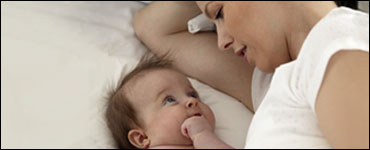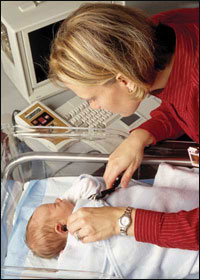Current Features
Newborn Hearing Screening Important for Development

Babies begin to develop speech and language from the time they are born. They learn by listening and interacting with the sounds and voices around them. But, when a baby is born with hearing loss, many sounds and voices are not heard, and the child's speech and language development can be delayed.

Each year in the United States, as many as 12,000 babies are born with a hearing loss. The cause of hearing loss for many babies is not known, and hearing loss can go unnoticed for years. It is important to identify hearing loss early. Early identification allows families to make decisions about their child's care that can affect speech, language, and social development.
Fortunately, almost all states, communities, and hospitals now offer hearing screening for all babies. The hearing screening is easy and painless, and can identify whether more testing is needed. In fact, babies often are asleep while being screened. It takes very little time—usually only a few minutes.
All infants should be screened for hearing loss no later than 1 month of age. It is best if they are screened before leaving the hospital. If the baby does not pass this hearing screening, it's very important to make an appointment for a full hearing test and any needed medical tests no later than 3 months of age.
A professional trained to test hearing loss, such as an audiologist, or an ear, nose, and throat doctor, will be able to perform these tests. The baby's doctor should perform or order any needed medical tests to find out the cause of the hearing loss. Because a newborn baby can pass the hearing screening and still develop a hearing loss, the baby's doctor should routinely follow the baby's general health, development, and well-being.
The goal for every newborn child with hearing loss is to receive medical, audiologic, educational, and support services no later than 6 months of age. Receiving services at an early age will help the child develop communication and language skills that will last a lifetime.
Every state has an Early Hearing Detection and Intervention (EHDI) program that works to identify infants and children with hearing loss and promotes timely follow-up testing and services for any family whose child has a hearing loss. If your baby has a hearing loss or if you have any concerns about your baby's hearing, call toll free 1-800-CDC-INFO or visit the EHDI Program site to learn more about this topic and available services in your area.
For More Information
- Early Hearing Detection and Intervention Program
- A Parent's Guide to Hearing Loss
- Educational Materials
- Hearing Loss
- Listen to a podcast in English (
 10:46 mins) or in Spanish (
10:46 mins) or in Spanish ( 13:11 minutos) on Early Hearing Detection and Intervention
13:11 minutos) on Early Hearing Detection and Intervention
Page last updated: May 12, 2008
Content source: National Center on Birth Defects and Developmental Disabilities
Content owner: National Center for Health Marketing
URL for this page: www.cdc.gov/Features/NewbornHearing

